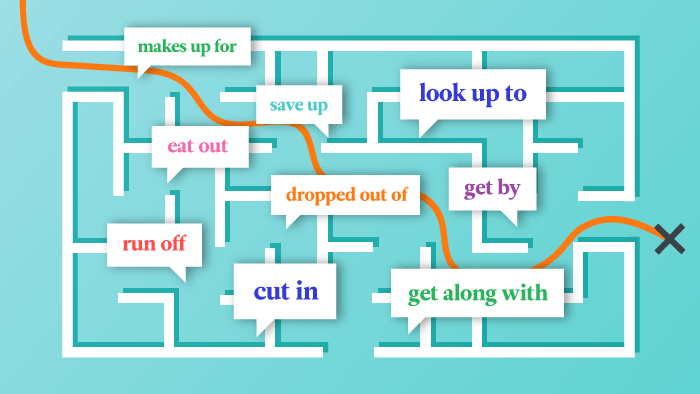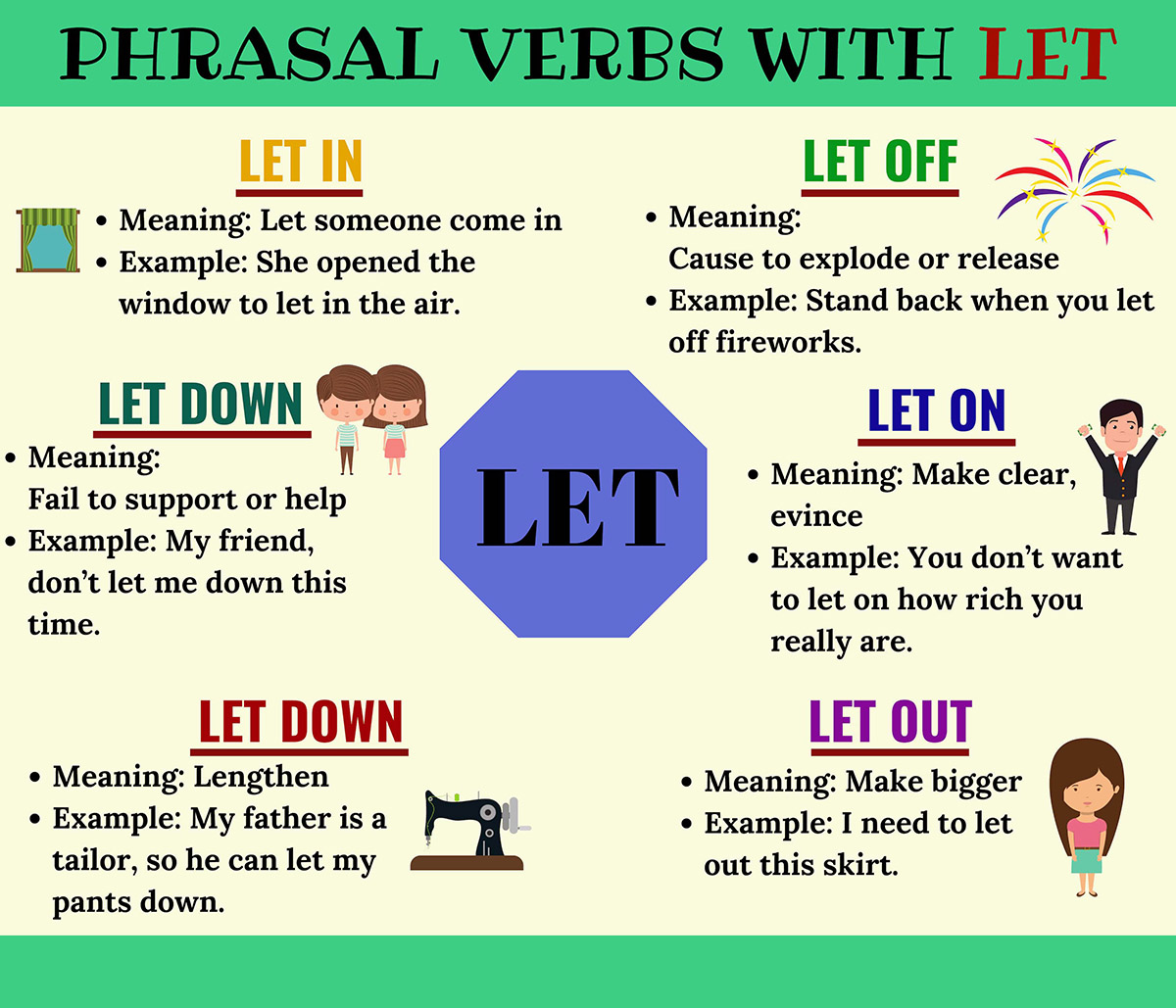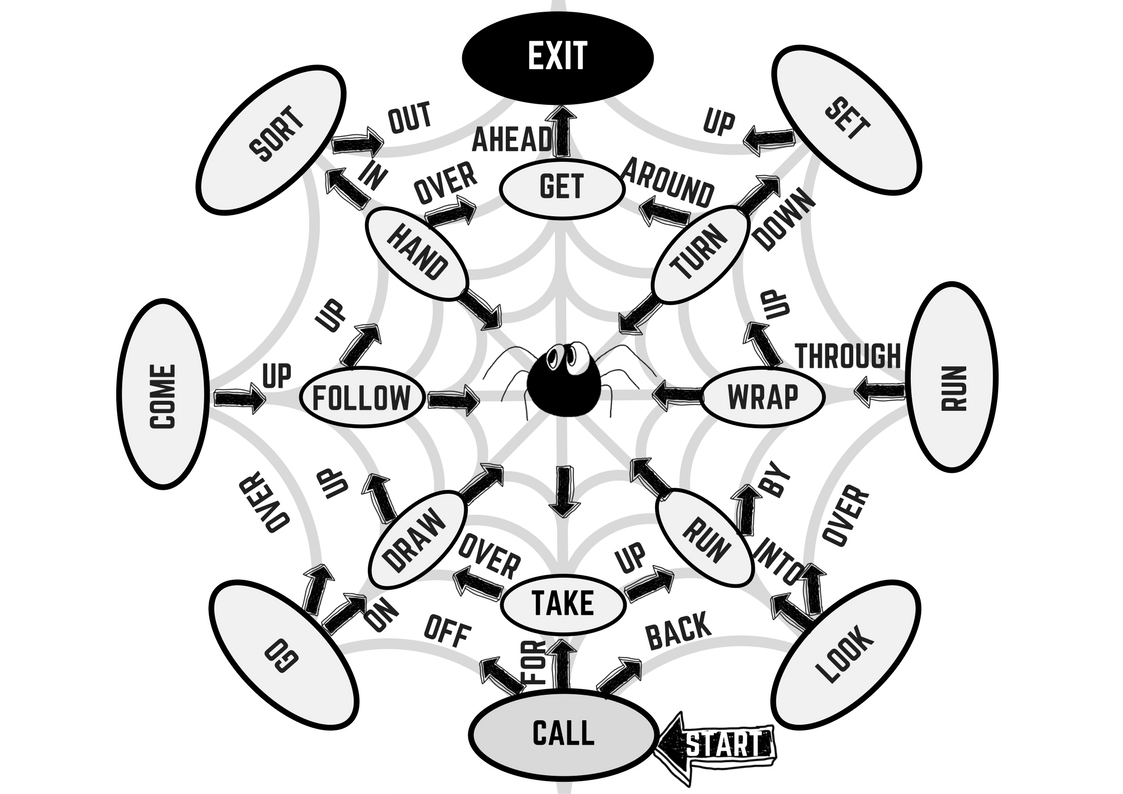

Hotline: 0906 201 222
Bạn đang thắc mắc về Phrasla Verbs? Không biết cách phân biệt Phrasal Verbs với Collocations hay Verb Phrases?
Hoặc muốn tìm hiểu phrasal verbs được hình thành thế nào và sử dụng ra sao? Hãy cùng đội ngũ học thuật Aland IELTS khám phá tất tần tật kiến thức về Phrasal verbs nhé!
Phrasal Verbs - Cụm động từ, là sự kết hợp giữa động từ với các tiểu từ là giới từ hoặc phó từ, có chức năng như động từ và thường tạo ra lớp nghĩa khác hơn so với nghĩa của động từ chính.
➣ Ví dụ: come up, turn into, come across, run into, looked outside …..
~ He opened the window and looked outside.
~ The show didn’t come up to what I expected.
~ My country has turned into developed nation.

➤ Nếu bạn đến các từ loại thông dụng khác, thường được sử dụng trong bài thi IELTS. Bạn có thể tham khảo thêm Modal Verbs: Chi tiết cách học và sử dụng
Phrasal verbs được cấu tạo từ hai hoặc ba thành phần: động từ với một giới từ hoặc phó từ; hoặc động từ với hai giới từ hoặc phó từ.
|
Verb |
Preposition/ Adverb |
Example |
|
Look |
down |
She thinks they look down on her because she have broken up. |
|
Switch |
off |
They are sleeping now, please switch the light off. |
|
Go |
up |
The percentage of smoking rates in women has significantly gone up during the period. |
|
Break |
down |
The woman broke down when the police told her that her husband had died in an accident. |
|
Verb |
Preposition/ Adverb 1 |
Preposition/ Adverb 2 |
Example |
|
come |
down |
with |
Her son came down with allergy last week because of the weather. |
|
get |
along |
with |
I was surprised that my new girlfriend got along with my sister. |
|
look |
forward |
to |
We are looking forward to the public holiday this year so that we can get away from it all and enjoy each company. |
|
cut |
back |
on |
You should cut back on sweets and fast food if you want to keep fit. |

Thông thường, phrasal verbs xuất hiện 3 loại chính:
➣ Intransitive phrasal verbs: Động từ cụm có chức năng là nội động từ, không có tân ngữ theo sau. For example:
~ My car broke down on the side of the highway.
( Xe của tôi bị hỏng bên lề đường cao tốc)
~ The flight will take off earlier to avoid the bad weather.
(Chuyến bay sẽ cất cánh sớm nhằm tránh thời tiết xấu xảy ra)
Có chức năng như nội động từ, các phrasal verbs này không được dùng ở thể bị động (passive). For example:
~ Correct: The New York Time comes out once a week.
~ Incorrect: The New York Time is come out once a week.
Một số phrasal verbs ở loại này: ask around, blow up, break down, break up, come back, get up, go on, grow up, look out, show up, stay on, take off, turn up, fall through, get by, watch out,...
➣ Non- separable transitive phrasal verbs: là những phrasal verbs, trong đó các thành phần không thể tách rời nhau và có chức năng như ngoại động từ (phải có tân ngữ kèm theo).
For example:
~ I was looking for my key which I had lost on the way.
(Tôi đang tìm kiếm chiếc chìa khóa tôi đã đánh mất trên đường)
~ The teacher calls on me for the opinion 1.
( Thầy giáo hỏi tôi về quan điểm thứ nhất)
Với loại động từ cụm chỉ có 1 động từ và 1 giới từ, trạng từ nếu có thường đi giữa động từ và giới từ.
~ I was looking everywhere for the passport. (NOT looking for everywhere).
Một số phrasal verbs là ngoại động từ luôn đi sát nhau: give away, give up, go after, go against, look after, look for, looking forward to, look out for, put up with, run into, run over, run through,
➣ Optionally separable transitive phrasal verbs
Phrasal Verbs trong loại này có chức năng là ngoại động từ, và có thể tách hoặc không tách các thành phần trong phrasal verbs.
For example:
~ They pulled the house down. (Họ đã phá hủy ngôi nhà)
~ They pulled down the house.
~ She made up a really interesting story. (Cô ấy đã bịa ra một câu chuyện thực sự thú vị).
~ She made the story up. (Cô ấy đã bịa ra một câu chuyện)
For example:
~ Let’s put it down ( NOT Let’s put down it)
~ They made it up ( NOT They made up it)
~ His grandparents brought him and his sister up after his parents died.
(Ông bà của anh ấy đã nuôi nấng anh ấy và chị gái sau khi ba mẹ mất)
➤ Nếu bạn chưa biết về cách để chỉ các hướng trong tiếng Anh, bạn nên xem thêm bài viết Các hướng trong tiếng Anh: Tất tần tật mọi điều cần biết
Phrasal Verbs có thể dễ hoặc khó hiểu tùy thuộc vào ngữ cảnh mà lớp nghĩa của chúng biểu đạt. Thông thường, bạn đừng nên tra từ điển ngay lập tức khi bắt gặp một phrasal verbs nào đó, hãy nhìn vào ngữ cảnh, tình huống của câu, đoạn, lời nói để hiểu chúng.
Một số Phrasal verbs có thể hiểu dễ dàng nghĩa được thể hiện trên mặt chữ ( nghĩa đen) của động từ và giới từ/ phó từ đi kèm.
For example:
~ You may meet with difficulties as first but you’ll find it easier as you go along.
(Có thể thời gian đầu bạn sẽ gặp khó khăn nhưng cứ tiếp tục đi, bạn sẽ thấy dễ dàng hơn).
~ They was walking across the street when they heard the sound of an explosion.
( Họ đang đi bộ qua đường thì nghe thấy âm thanh của vụ nổ nào đó)
Tuy nhiên, một số phrasal verbs có ý nghĩa tượng trưng ( nghĩa bóng)
For example:
~ Could you put me up for tonight? (Tối nay tôi ở nhờ nhà bạn được không?
“Put up” không có nghĩa là xây dựng ( như putting a fence up). Trong trường hợp này, chúng có nghĩa là cho phép ai đó ở trong nhà của bạn.
~ She came back and they made up ( Cô ấy quay trở lại và họ làm lành với nhau)
“Make up” không có nghĩa là trang điểm hay bịa chuyện ( như make up a story). Trong trường hợp này, make up có nghĩa là làm lành với ai đó.
~ He has always looked down on me ( Anh ta luôn nghĩ rằng anh ta tốt hơn tôi).
Look down on someone không có nghĩa là bạn nhìn ai đó từ địa điểm cao hơn, look down on someone nghĩa là bạn nghĩ bạn tốt hơn ai đó.
Phrasal verbs trong tiếng Anh cũng giống như nhiều ngôn ngữ khác, không phải để dàng để đưa ra quy luật chung cho bất kỳ một hình thức sử dụng ngôn ngữ nào.
Do đó, để học được Phrasal verbs, hầu như các bạn sẽ phải học “học gì biết nấy”. Tuy nhiên cũng có nhiều cách khác nhau để học Phrasal verb sao cho dễ nhớ và dễ dùng nhất.
~ Ví dụ: Chủ đề Travel and Holidays
My friends was waiting to pick me up when I came to Hong Kong.
Passengers are requested to check in two hours before the flight.
I would like to travel by motorbike because I could look around the stunning sights during the trip.
|
Verb |
Meaning |
Vietnamese |
Example |
|
blow up |
Explode |
nổ |
The terrorists tried to blow up the main Hall |
|
bring up |
mention a topic |
|
My mother brought up that little matter of my prison record again. |
|
bring up |
raise children |
nuôi nấng |
Her uncle brought him up after his parent died. |
|
call off |
Cancel |
trì hoãn |
They called of the meeting yesterday. |
|
do over |
repeat a job |
làm lại |
Do this homework over. |
|
fill out |
complete a form |
điền đơn |
Fill out this application form and mail it in. |
|
find out |
Discover |
tìm ra, khám phá ra |
Some experts found out the reasons of water pollution |
|
give back |
return an object |
trả lại |
My friend borrowed my books. I have a feeling he's not about to give them back. |
|
Leave st/ sb out |
Not include so or sth |
bỏ sót |
I’ve made a list of names- I hope I haven’t left anyone out. |
|
look over st |
To quickly examine, check st |
kiểm tra |
Could you quickly look over these figures for me and see if there are any mistakes? |
|
point out |
call attention to |
nhấn mạnh |
She was quick to point out that it wasn’t her fault. |
|
put off |
Postpone |
trì hoãn |
Our boss will put off the meeting until tomorrow. |
|
put on |
put clothing on the body |
mặc quần áo |
I put on a sweater and a jacket. |
|
Read st over/ through |
Peruse |
đọc kỹ |
I read over the research, but couldn't make any sense of it. |
|
set up |
to arrange, begin |
sắp xếp, thiết lập |
They set up the conference exactly the way their manager wanted it. They set it up. |
|
talk over |
discuss |
Thảo luận |
We get some troubles. We need to talk them over. |
|
throw away |
discard |
Vứt bỏ |
US consumers throw away around 100 billion plastic bags annually. |
|
try on |
put clothing on to see if it fits |
Thử quần áo |
She tried on fifteen jeans before she took the one. |
|
try out |
Test to see how useful or effective st or so |
Thử, xem xét, kiểm tra ( tính hữu ích và hiệu quả của nó) |
I tried out five cars before I could take one that pleased me. |
|
turn down |
lower volume |
Vặn nhỏ tiếng lại. |
Please turn down the radio. I want to sleep. |
|
turn down (2) |
reject |
Từ chối |
He turned down the application for a promotion twice this year. |
|
turn off |
switch off electricity |
Tắt thiết bị điện |
Please turn off the light before leaving the room. |
|
turn off (2) |
repulse |
Làm mất hứng |
The film really turned me off because of its a disgusting. |
|
turn on |
switch on the electricity |
Bật thiết bị điện |
It gets dark, please turn on the light. |
|
Verb |
Meaning |
Vietnamese |
Example |
|
call on |
visit |
thăm |
The Prime Minister called on the disabled in the hospital. |
|
get over |
recover from sickness or disappointment |
Vượt qua, qua khỏi |
I got over the flu, but I don't know if I'll ever get over my broken heart. |
|
go over |
review |
Ôn tập |
The students went over the material before the exam. They should have gone over it twice. |
|
go through |
use up; consume |
Thông qua |
The proposals for the new shopping centre will be likely to go through. |
|
look after |
take care of |
Chăm sóc |
Grandpa will take care of me when I get sick. |
|
look into |
investigate |
Điều tra |
We are looking into the possibility of merging the two departments. |
|
run across |
find by chance |
Tình cờ gặp |
I ran across some old friends when I went back to my school. |
|
run into |
meet |
|
Carlos ran into his English professor in the hallway. |
|
take after |
resemble |
Giống với ai đó |
My first son seems to take after his father. |
|
wait on |
serve |
|
It seemed strange to see my old boss wait on tables. |
|
Verb |
Meaning |
Vietnamese |
Example |
|
break in on |
interrupt (a conversation) |
Làm gián đoạn |
Something broke in on my call when I was phoning my brother. |
|
catch up with |
keep abreast |
Bắt kịp với, theo sát với |
We need to catch up with the neighbors and the news around town after a long trips. |
|
come up with |
to contribute (suggestion, money) |
Quyên góp |
The charity was able to come up with a thousand-dollar donation after many years of nothing. |
|
come up with (2) |
Suggest or think of an idea or plan |
Nảy ra, nghĩ ra |
Steve came up with a new way to use up cold chicken. |
|
cut down on |
curtail (expenses) |
Cắt giảm, hạn chế |
We tried to cut down on the money we were spending on milk tea each month. |
|
drop out of |
leave school |
Bỏ học |
He dropped out of school and found a job. |
|
get along with |
have a good relationship with |
Có mối quan hệ tốt với ai đó, hòa đồng với ai đó |
It’s hard for her to get along with new colleagues. |
|
get rid of |
eliminate |
Loại bỏ, xóa bỏ |
The government tried to get rid of their corrupt mayor in the recent election. |
|
look forward to |
anticipate with pleasure |
Mong chờ , hy vọng điều gì đó |
I am looking forward to receiving your presents on my birthday. |
|
look down on |
despise |
Coi thường |
They always look down on her because she doesn’t have a job. |
|
look in on |
visit (somebody) |
Thăm ai đó |
Nowadays, older people don’t have a nearby relative who will look in on them. |
|
look out for |
be careful, anticipate |
Xem xét, chú ý |
Look out for him while you’r there. |
|
look up to |
respect |
Tôn trọng ai đó |
Anna always looked up to his uncle. |
|
put up with |
tolerate |
Chịu đựng |
I can put up with the classroom being messy, but I hate it if it’s not clean |
|
run out of |
exhaust supply |
Cạn kiệt |
We are running out of time- the flight has to take off two hours later. |
|
walk out on |
abandon |
Bỏ, từ bỏ |
The parents walked out on their three children. |
|
Verb |
Meaning |
Vietnamese |
Example |
|
break down |
stop functioning |
Bị hỏng |
My car has just broke down for a week and I has had to take a taxi to go to office. |
|
catch on |
become popular |
Trở nên phổ biến |
The game will catch on with young people. |
|
come back |
return to a place |
Trở về |
After a long trip, they come back to their hometown. |
|
come in |
enter |
vào |
Try not wake anyone when you come in. |
|
come to |
regain consciousness |
Tỉnh lại |
She sat by the child’s bedside until he came to. |
|
come over |
to visit |
Thăm nhà ai đó |
The children came over for dinner the other night. |
|
drop by/in |
visit without appointment |
Ghé qua |
I dropped in on Anna on my way home from the office but she wasn’t at home. |
|
eat out |
dine in a restaurant |
Ăn ngoài |
We love eating out together at the weekend. |
|
get by |
survive |
Tồn tại, sống qua, vượt qua |
Many families now try to get by without health insurance. |
|
grow up |
get older |
Lớn lên |
They grew up together and became the best friends. |
|
pass out |
lose consciousness, faint |
Bất tỉnh |
He was hit on the head and passed out. |
|
show off |
demonstrate haughtily |
Thể hiện, muốn gây chú ý, khoe khoang |
He only bought the sport car to show off and prove her wealthy. |
|
show up |
arrive |
Đến, tới |
Gorge didn’t show up although I invited him. |
➤Nếu bạn muốn mở rộng thêm vốn từ của mình để chuẩn bị tốt nhất cho kỳ thi IELTS, bạn nên tham khảo thêm Từ vựng IELTS theo chủ đề | Danh sách, Thành ngữ, Topic

Exercise 1: Choose the correct phrasal verb: go on / pick up / come back / come up with / go back / find out / come out / go out / point out / grow up / turn out / come in(to) / take on. Conjugate the verb if necessary.
1. Could you ________________________________________ (think of an idea) a better idea?
2. She ________________________________________ (showed / mentioned) that the stock rose as high as $16 in April.
3. I ________________________________________ (went to an event) for dinner with my colleagues last night.
4. He ________________________________________ (entered a place where the
speaker is) the kitchen and made some tea.
5. George ________________________________________ (become an adult) in a village.
6. As I arrived, he ________________________________________ (appeared from a place) of the door.
7. She ________________________________________ (got something from a place) some dinner on the way home.
8. At the end of the film, it ________________________________________ (in the end we discovered) that John was a good guy.
9. How are you ()______________________ at your new job?
10. It took her a long time to ______________________ such a terrible accident.
Answer key
1. come up with
2. pointed out
3. went out
4. came into
5. grew up
6. came out
7. picked up
8. turned out
9. getting on
10. get over
Exercise 2. Choose the best phrasal verbs for the following sentences
1. He ( came up with/ came into/ went back) a solution.
2. Could you (point out/ find out/ turn out) what time we need to arrive?
3. Many children ( come up / come down/ come to) with an ear infection even before their first birthday.
4. Most people (get up/ get out/ get over) a cold within two weeks.
5. I can’t wait to (get back/ get off/ get rid of) that ugly old couch.
6. I can't believe who (drop out/ dropped in/ come in) on us last night.
7. He couldn't (get along with/ get well/ get over) his mother-in-law.
8. I guess we need to (go over/ go through/ go up) the whole song a few more times.
9. She is glad they (look up to/ look down on/ look for) her.
10. I'm sorry, but you can't (makeup/ made by/ marked down) that test you missed.
Answer key:
1. came up with
2. find out
3. come down
4. get over
5. get rid of
6. dropped in
7. get along with
8. go through
9. look up to
10. make up
Trên đây là tất cả những kiến thức cần thiết về Phrasal Verbs mà team học thuật Aland IELTS đã dày công tìm hiểu và tổng hợp. Hy vọng sẽ giúp các bạn hiểu phần nào về loại từ vựng đặc biệt này trong tiếng Anh. Mở rộng kho từ vựng của mình, cũng như học được các vận dụng từ vựng một cách hiệu quả để đạt điểm cao trong bài thi này.
Chúc các bạn học tốt!